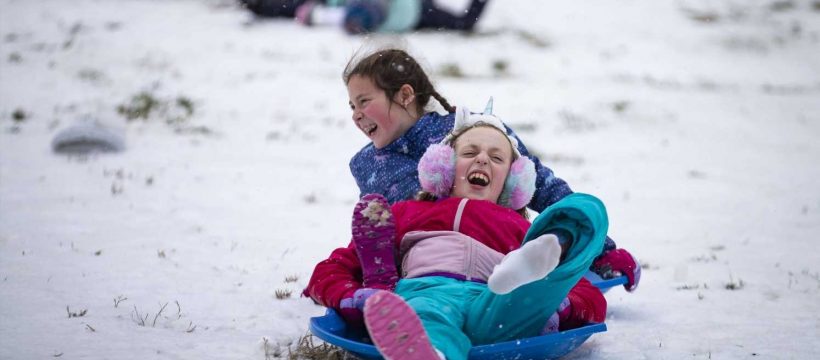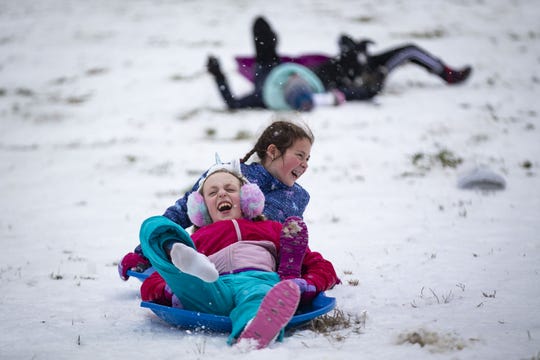New York City public schools, the country’s largest school district, canceled snow days when it announced its new 2021-2022 school year calendar.
“On ‘Snow days’ or days when school buildings are closed due to an emergency, all students and families should plan on participating in remote learning,” the city’s school district website stated.
Many waxed nostalgic about snow days on social media and expressed disapproval of the move by NYC public schools. And experts say the change has positive and negative implications for students that have experienced a seismic shift in their schooling due to the pandemic.
“As a retired NYC teacher, I’m appalled by this news,” @hemleeloquy tweeted. “Just let them have their snow day, people. We can’t forget that we were once children.”
“It’s truly unfair that children will not experience the snow day magic I did, which was actually me and my sister watching hours of TV and not being able to leave our house until our mom came home from work,” @katie_honan wrote on Twitter.
@GabStaton wrote: “I feel like if I were a teacher those kids would be watching me watch TV the whole day.”
Students are more in need of positive experiences than ever to de-stress, according to Prerna Arora, an assistant professor of school psychology at Columbia University.
“If we’re not getting those via activities such as snow days, where students have historically been known to be able to play with friends … it’s going to be critical for schools and families to make sure that students are able to (receive) that kind of support in other avenues,” Arora says.
However, continuous and consistent learning is also important for children, argues Sandra L. Calvert, a Georgetown University psychology professor.
“I know it’s fun to think, ‘gee, I’m going to get a day off when it snows,’ but you don’t really get the day off, you have to make it up,” she says, adding in her view its negative for “the intellectual development of children if they’re out of school a lot, even though it’s fun to go out and sleigh ride and do all those things.”
For more details: Snow days canceled at New York City public schools
New York City public schools, the country's largest school district, effectively canceled snow days when it announced its new 2021-2022 school year calendar. (Photo: AL DRAGO, Getty Images)
Some are also losing snow day superstitions
New York City’s change also signals the end of snow day rituals for kids. Some common snow day superstitions include children wearing their pajamas inside-out for good luck, doing snow dances and staying glued to news tickers for snow day announcements.
For Patrick Murphy, snow days remind him of growing up in Guilderland, New York, in the 1970s.
“We would get all bundled up to spend the day outside,” Murphy, 56, says. “The schools didn’t close too often, it would take about a foot of snow at least. But the days off were magic!”
Murphy, who now lives in Arvada, Colorado, recalls getting up early and listening to the school cancellation list on the radio. When there was enough snow, that meant helping his dad clear it.
As soon as the driveway was set, he enjoyed a day full of sledding; about 15 or 20 kids would gather on the neighborhood hills.
“About the time our limbs were going numb we would head home to warm up and get dry with hot chocolate or soup,” he says. “That’s not exactly what kids that are camped in front of a laptop will get to experience.”
That may be true – but given the academic rigor and expectations of the education system, Calvert says many students have a lot of catching up to do after a year interrupted by the pandemic.
“Trying to get in as many possible school days as we can is one way to remedy some of the academic situation,” she says.
But kids’ mental health has also been greatly impacted by the pandemic, notes Arora. Fun activities like snow days could give kids hope when they need it most.
“With regards to snow days, the concern many are having is removing positive experiences from youth, especially during a time where so much – birthday parties, play with friends, sports …. – has been taken from them already,” she says.
A Mental Health America report recently found the rate of 11 to 17-year-old children screened in 2020 for anxiety and depression was up 9% compared to 2019. A national Gallup poll in June 2020 revealed that about 3 in 10 parents indicated social distancing and school closures were making their children experience emotional or mental harm.
The loss of snow days could negatively impact kids psychologically, Arora says, the same way they’ve been affected by missing school dances and group sports.
“If we’re going to take this away, I think it’s imperative that we consider how schools can still be in the business of educating our children and making sure they get the services they need, while also supporting their other mental health in different ways.”
Children’s mental health: What to know a year into the pandemic
If snow days are off the table, parents can still make sure their kids mark these weather-related days at home. Parents can build in some sledding time for kids as a break from the day when it snows, especially for younger kids, Calvert says.
One thing is clear: Experts agree remote learning when kids physically can’t be in school is here to stay.
“As a culture and across cultures, we’ve all learned a lot about how to provide continuity in instruction, during times when kids can’t be in face-to-face settings,” Calvert says. “And I expect that will continue over in the future in many different places as we resume school.”
Important: Students crushed by stress, depression are back in class. Here’s how schools meet their needs
Source: Read Full Article

